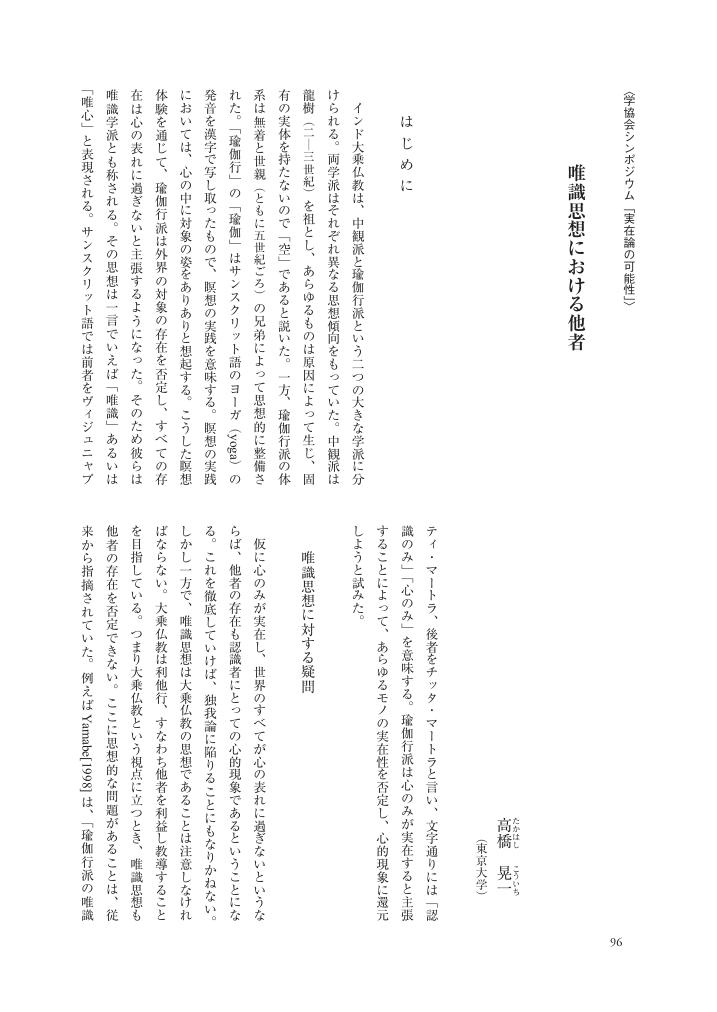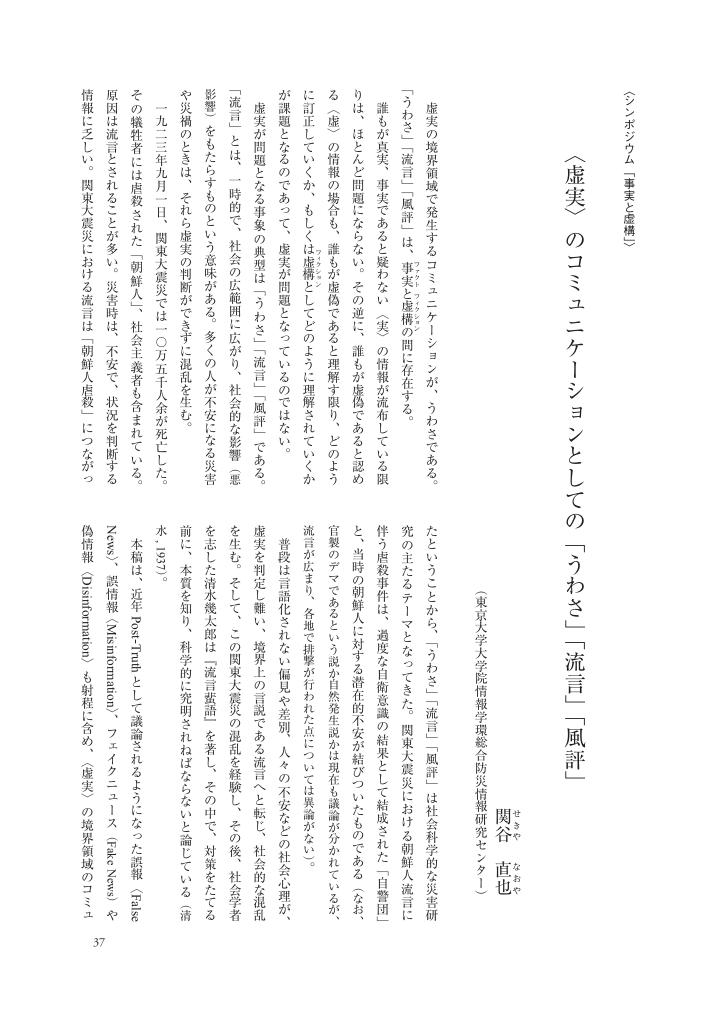7 0 0 0 人の移動の哲学(社会と文化の変動の基礎理論)
ヘラクレイトスの「万物は流動する」(panta rhei)やゼノンのパラドックスを引くまでもなく、哲学の源流をなす思想家たちにとって《動き》は重要なテーマであった。モノの動きとヒトの動きにはどれほどの共通性があり、どこが違うのか。あるいは同じ動物の動きの中で、人間の動きにはどんな特徴があるのか。「人の移動の哲学」は、そうした哲学の根本問題に立ち返りながら知の組み替えを図り、同時に現代の社会と文化の変動が突きつけてくる実践的な難問に応答することを試みるものである。1年目は、「人の移動」を《哲学する》方法論の探究に主力を費やし、研究代表者の野家啓一は、「人の移動」がもたらす境界領域としての「異界」に注目する作業を始めた。2年目は、「人の移動」を可能にする空間のあり方を主たる検討課題とした。次いで、「人の移動」に関連する文化現象の一例として、「メタファー」を取り上げ、東北哲学会との合同シンポジウムを開催した。3年目は「人の移動」を可能にする時間のあり方の吟味から共同研究をスタートさせた。次いで、「人の移動」の哲学の基礎理論を固めるべく、世界的に再評価の動きが見られる哲学者ディルタイを取り上げ、東北哲学会との合同シンポジウムを開催した。哲学・倫理学の研究者を核として、社会心理学、比較文化論・農業経済学という関連領域の第一線のメンバーを分担者に加えた本研究の成果は、すでに各種のシンポジウムで公開したほか、東北大学倫理学研究会の協力のもと三冊におよぶ資料集を発行し、関係諸機関に送付してある。さらに研究代表者・協力者の個別の論文・報告にも共同研究の成果は折り込み済みである。
- 著者
- 大森 淳史
- 出版者
- 帝塚山学院大学
- 雑誌
- 帝塚山學院大学研究論集. 文学部 (ISSN:1346485X)
- 巻号頁・発行日
- vol.42, pp.29-39, 2007
7 0 0 0 OA 労働と格差の政治哲学(<特集>「労働」と「格差」)
- 著者
- 宇野 重規
- 出版者
- 東京大学社会科学研究所
- 雑誌
- 社會科學研究 (ISSN:03873307)
- 巻号頁・発行日
- vol.62, no.3/4, pp.153-172, 2011-03-15
本稿は「労働」と「格差」について, 政治哲学の立場からアプローチする. 現代社会において, 労働は生産力のみならず社会的なきずなをもたらし, さらに人々に自己実現の機会を与えている. 対するに格差は, 社会の構成員の間に不平等感や不公正感を生み出すことで, 社会の分断をもたらす危険性をもつ. このように労働と格差は, 正負の意味で政治哲学の重要なテーマであるが, これまでの政治哲学は必ずしも積極的に向き合ってこなかった. その理由を政治思想の歴史に探ると同時に, 現代において労働と格差の問題を積極的に論じている三人の政治哲学者の議論を比較する. この場合, メーダが, 政治哲学と経済学的思考を峻別するのに対し, ロールズは, ある程度, 経済学的思考も取り入れつつ, 独自の政治哲学を構想する. また, 現代社会が大きく労働に依存している現状に対しメーダが批判的であるのと比べ, ネグリのように, あくまで労働の場を通じて社会の変革を目指す政治哲学もある. 三者の比較の上に, 新たな労働と格差の政治哲学を展望する.
- 著者
- 小田部 胤久
- 出版者
- 東京大学大学院人文社会系研究科・文学部美学芸術学研究室
- 雑誌
- 美学藝術学研究 (ISSN:13426095)
- 巻号頁・発行日
- vol.17/18, pp.33-57, 2000-03-24
- 著者
- 小林 伸行
- 出版者
- 京都大学大学院教育学研究科
- 雑誌
- 京都大学大学院教育学研究科紀要 (ISSN:13452142)
- 巻号頁・発行日
- vol.53, pp.405-418, 2007-03-31
社会は「いかにあるか」、 「いかにして可能か」。これらは社会は「在る」ことを自明視した上に初めて成立する問いである。しかし、これまで「なぜ社会はあると言えるのか」という哲学的な問いについては、思いの外、不問に付されてきたように思われる。哲学で問題になる存在(者)は専ら心と身体(を始めとする物理的存在)に尽きる一方、心身に還元できないものとして社会を固有の分析対象とする社会学自身が社会の実在性を問題とすることは殆どなかったからである。勿論、それが「社会の捉え方」と無関係であるのなら、少なくとも社会学的な問いとしては浮上して来ないのであるから何の問題もないであろう。だが、果たして「社会が在ることの捉え方」と「社会の捉え方」とは無関係であり得るのだろうか? 本稿は、 N.ルーマンの社会システム論を介して、この両者の関係を浮き彫りにしようとする試論である。そしてその際、 「哲学的ゾンビ」という概念に着目する。
6 0 0 0 OA 唯識思想における他者
- 著者
- 高橋 晃一
- 出版者
- 日本哲学会
- 雑誌
- 哲学 (ISSN:03873358)
- 巻号頁・発行日
- vol.2020, no.71, pp.96-106, 2020-04-01 (Released:2020-05-12)
- 参考文献数
- 11
6 0 0 0 OA 書評
6 0 0 0 OA 始まりを問う哲学史
- 著者
- 納富 信留
- 出版者
- 日本哲学会
- 雑誌
- 哲学 (ISSN:03873358)
- 巻号頁・発行日
- vol.2017, no.68, pp.45-62, 2017-04-01 (Released:2017-06-14)
- 参考文献数
- 1
In the first part of this paper, in order to reconsider the significance of the history of philosophy, I examine its relationship with philosophy in three respects. First, the history of philosophy aims to examine the beginning (archē) of philosophy. By revealing its beginnings (not only in ancient Greece), we can start to engage in a new philosophy. Second, the history provides us with philosophical texts that encourage our thinking. We find there rich resources of reasoning and ideas on philosophical issues. Third, this history shows us our own position in two ways. It presents a set of philosophical concepts, problems and frameworks that we inherit from past philosophers. Also, an examination of this heritage reveals our own position within philosophy.In the second part, I critically survey the various candidates for “first philosopher” in ancient Greece. Each thinker, from Thales to Plato, has supporters and good justification for being considered the first. Then, in the third part, I propose a new perspective, “compound eye history”, in which we investigate plural lines of thinking. Each distinct line started from a new problem raised by a philosopher and developed through critical or positive responses by his contemporaries or later thinkers. I envisage 10 “plots” or lines of ancient philosophy by which we can conceptualise that whole intellectual activity of human life and wisdom.
6 0 0 0 OA 「自分も哲学者に成りたくなつた」 内村鑑三晩年の夢
- 著者
- 関根 清三
- 出版者
- 日本基督教学会
- 雑誌
- 日本の神学 (ISSN:02854848)
- 巻号頁・発行日
- vol.61, pp.9-33, 2022-09-25 (Released:2023-12-07)
6 0 0 0 OA 社会科学方法論をめぐる現状について
- 著者
- 竹内 啓
- 出版者
- 日本科学哲学会
- 雑誌
- 科学哲学 (ISSN:02893428)
- 巻号頁・発行日
- vol.13, pp.35-48, 1980-11-20 (Released:2009-05-29)
6 0 0 0 OA 制度のなかで生きるとはどのような経験か—公共的正当化論の再考に向けて—
- 著者
- 那須 耕介
- 出版者
- 日本法哲学会
- 雑誌
- 法哲学年報 (ISSN:03872890)
- 巻号頁・発行日
- vol.2000, pp.164-172, 2001-10-30 (Released:2008-11-17)
- 参考文献数
- 9
6 0 0 0 OA 〈虚実〉のコミュニケーションとしての「うわさ」「流言」「風評」
- 著者
- 関谷 直也
- 出版者
- 日本哲学会
- 雑誌
- 哲学 (ISSN:03873358)
- 巻号頁・発行日
- vol.2022, no.73, pp.37-47, 2022-04-01 (Released:2022-07-21)
- 参考文献数
- 21
6 0 0 0 OA ニーチェ哲学における良心という問題
- 著者
- 竹内 綱史
- 出版者
- 宗教哲学会
- 雑誌
- 宗教哲学研究 (ISSN:02897105)
- 巻号頁・発行日
- vol.20, pp.65-76, 2003 (Released:2019-03-21)
Das Problem des Gewissens ist eines der zentralen Themen in Nietzsches Philosophie. Er erwähnt das Gewissen immer wieder und kritisiert das gemeine Gewissen. Dieses ist heteronom, denn als Sittlichkeit gehorcht es der Sitte. Nietzsche nennt dies das “Herdengewissen.” Er stellt dagegen das “intellektuelle Gewissen.” Es ist ein Gewissen gegen das Herdengewissen. Es sagt: “warum gehorchst du deinem Gewissen ?” Der Mensch, der auf diese Stimme horcht und sich ein solches Gewissen einverleibt, will nach eigenem Wissen handeln. Er ist also autonom. Nietzsche zielt darauf, diese Menschen zu züchten, und nennt sie “neue Philosophen.” Das Wort “Gewissen” stammt etymologisch von “mit-wissen.” Das Herdengewissen ist das Mit-wissen mit der Massen und das intellektuelle Gewissen das mit sich selbst. Dieses ist Autonomie und transzendiert sich auf eigene Möglichkeiten, auf die eigene Zukunft. Nun muß der Mensch die eigene Zukunft entwerfen von der Zeit des Todes Gottes her. Laut Nietzsche soll dieser Entwurf die Aufgabe der neuen Philosophen sein. Das intellektuelle Gewissen ist somit eine notwendige Voraussetzung für die neuen Philosophen. Es ist daher Nietzsches Aufgabe, dieses Gewissen zu pflanzen und neue Philosophen zu erziehen. Er ist der Philosoph der Philosophen, das heißt, er denkt über das Wesen der Philosophie nach.
6 0 0 0 OA 聴覚の座をめぐる近代哲学の伝統 : ヘルダー、カント、ヘーゲルの場合
- 著者
- 吉田 寛
- 出版者
- 美学会
- 雑誌
- 美学 (ISSN:05200962)
- 巻号頁・発行日
- vol.61, no.1, pp.25-36, 2010-06-30 (Released:2017-05-22)
Scholars in many disciplines have talked about the "hegemony of vision" in the modern Western culture and philosophy. We also know that the most critical issue of modern philosophy of perception had been the compatibility between vision and touch, as viewed in the prolonged discussion of Molyneux's Question. But, on the contrary, we know very little about the significance of audition and hearing in the tradition of modern philosophy. This paper is thus intended as a historical sketch of the status of hearing, examining the texts of three philosophers. For Herder, the ear is the most nearest sense to the soul, and the audition stands in the middle of our five senses, dominating the others. But, at the same time, he also attaches great importance to touch, inheriting the tradition of Molyneux's Question, and therefore presupposes a kinship between hearing and touch. Kant exiles the ear from his conception of the critique of judgment, preferring the eye as a normative sense for disinterested and formal judgment. But he emphasizes a moral function of the ear in his critique of practical reason, as an organ hearing the voice of reason, i.e. the divine voice. The ear, finally, gains a definitive advantage over the eye with Hegel. He describes the progress of Romantic art from painting to music as a process of the "negation of dimension." In his view, time is negation (or sublation) form of space, and equally the audition is that of vision. We can say therefore that the hypothetical "hegemony of vision" was never stable, and the status of seeing has always been challenged and undermined by the hearing in the course of modern philosophy.
6 0 0 0 OA ミシェル・フーコーにおけるパレーシアと民主主義の循環的成立について
- 著者
- 池田 信虎
- 出版者
- 日仏哲学会
- 雑誌
- フランス哲学・思想研究 (ISSN:13431773)
- 巻号頁・発行日
- vol.28, pp.130-141, 2023-09-01 (Released:2023-10-01)
6 0 0 0 OA 仏教民俗学の思想 : 五来重について
- 著者
- 碧海 寿広
- 出版者
- 日本宗教学会
- 雑誌
- 宗教研究 (ISSN:03873293)
- 巻号頁・発行日
- vol.81, no.1, pp.117-141, 2007-06-30 (Released:2017-07-14)
近年、仏教研究において「生活」の再評価が進んでいる。ゆえに、日本人の「生活」の歴史と仏教との関係をよく考えてきた仏教民俗学、特に五来重によるそれの思想的な意義を再検討する必要が出てきた。五来は彼の同時代の仏教をめぐる学問や実践のあり方に対して非常に批判的だった。特に仏教を哲学的なものとして理解する想定に疑問を抱き、代わりに仏教を受容する普通の人々の現実生活に即した彼の日本仏教観を提示した。その五来の仏教思想は、実践すなわち身体的・行為的な次元の仏教に主な焦点を当てた。彼の思想からは、人々の実践の中に存在するあらゆる形態の仏教を、その洗練度を問わず等しく認識し評価し反省するための視座を学ぶことができる。五来の思想には、「庶民信仰」に関する過度に理念化された論理の展開など問題もある。が、私たちが特定の学問枠組みから自由になって仏教をめぐる思考を深めようとする際、五来の思想から得られる知見はいまだに多大である。
6 0 0 0 OA アンスコムの実践的知識論
- 著者
- 鴻 浩介
- 出版者
- 日本哲学会
- 雑誌
- 哲学 (ISSN:03873358)
- 巻号頁・発行日
- vol.2017, no.68, pp.169-184, 2017-04-01 (Released:2017-06-14)
- 参考文献数
- 16
According to G. E. M. Anscombe’s proposal, agents have a special way of knowing about their own intentional actions - they have the capacity to know what they are intentionally doing without relying on any evidence from observation, inference and so on. Anscombe dubbed this special knowledge “practical knowledge” and took it to be an essential mark of agency. This article attempts an explanation and vindication of this Anscombean approach to agency.The discussion falls into four sections. In the first section, I clarify the nature of Anscombe’s practical knowledge and argue that the principal task for us is to spell out how one can be justified in believing not just what one intends, but what one is intentionally doing without any evidence. In Section II, I discuss what is generally considered to be the most promising way of dealing with this task: the reliabilism strategy. On this view, practical knowledge is justified because there is a reliable efficient-causal link between an agent’s intention to φ and his/her actually doing φ. I am willing to accept the reliabilism strategy as being basically on the right track. However, in Section III, I argue that the reliabilism strategy overlooks an important element of Anscombe’s discussion, namely that practical knowledge is the “formal cause” of what it understands, i.e., intentional actions. With this observation in place, we can give an even more comprehensive account of the nature of practical knowledge. In Section IV, I close with a suggestion that the structure of practical knowledge so understood is surprisingly similar to the structure of the knowledge that makers of artifacts are said to have, and this similarity can support the claim that practical knowledge is knowledge about an objective, public world.
6 0 0 0 OA メディアに見る性的少数者の表象 再名づけの実践とイデオロギーの戦略
- 著者
- 木場 安莉沙
- 出版者
- カルチュラル・スタディーズ学会
- 雑誌
- 年報カルチュラル・スタディーズ (ISSN:21879222)
- 巻号頁・発行日
- vol.7, pp.117-142, 2019 (Released:2019-10-21)
- 参考文献数
- 29
本研究は言語的/パラ言語的情報をマルチモーダルに分析し、哲学的知見と言語学的知見の交錯するところに位置づけられるものである。本研究ではメディアに見られる性的少数者の表象を対象とし、バトラーやフーコーの知見を援用しつつディスコース分析の手法を用いて、セクシュアリティの表象に見られる特徴や、表象と関連して動的に産出されるパワーおよびイデオロギーについて考察する。データとして子供向けアニメ映画やバラエティ番組を扱い、そうしたフィクションおよびノンフィクションにおける表象の間に関連性が見られるかどうか、また表象に働きかける「イデオロギーの戦略」や「攪乱」の可能性について明らかにすることが本研究の目的である。分析の結果から、ノン/フィクション間には表象上の類似点が見られるものの両者ともに新しいキャラクラーの登場によって表象の揺れが見られること、このことが攪乱の現れであるとともにその契機となること、さらに、一貫して変わらないように見える表象も異なる(そして多層的な)イデオロギーの戦略から産出されていることが明らかとなった。
6 0 0 0 OA 新プラトン主義と中世ドイツ神秘思想に於ける「一性」の問題
- 著者
- 吉田 喜久子
- 出版者
- 宗教哲学会
- 雑誌
- 宗教哲学研究 (ISSN:02897105)
- 巻号頁・発行日
- vol.5, pp.60-77, 1988 (Released:2018-03-15)
Im neuplatonischen Denken wird alles als Resultat der Entfaltung des Einen, der ersten Hypostase, angesehen. Das Eine, welches in keinem Sinne Differenz und Andersheit enthält, ist für alles Seiende einschließlich der menschlichen Seele sowohl der Ursprung wie auch Ziel, zu dem die Seele über den Geist, d. h. über die in sich durch Differenz relationale Einheit, zurückkehren soll. Die Einheit des Einen wurde innerhalb des Christentums vor allem von den mystischen Strömungen tradiert. Erstmals bei Meister Eckhart ist das neuplatonische Eine mittels der proklischen negatio negationis, doch im von Eckhart veränderten Sinne, zum entscheidenden Element einer christlichen Ontologie geworden. Obgleich das Eine bei Eckhart, das grundsätzlich wohl aus seinen religiös erfahrenen Überzeugungen stammt, nicht nur vom Standpunkt der historischen Einflüsse oder Zusammenhänge zu erklären ist, kann die Notwendigkeit, warum bei Eckhart das neuplatonische Eine sich mit dem christlichen absoluten Sein verbinden muß, schon im neuplatonischen Einen selbst gefunden werden. Wegen dieses Einen konnte Eckhart, anders als Thomas von Aquin, das Sein, welches die ganze Struktur der mittelalterlichen Metaphysik stützt, auf seine Absolutheit hin untersuchen. Doch das Eine ist bei Eckhart nicht nur die Einheit als einziges Wesen der Dreiheit Gottes, weil es sowohl ontologischer als auch soteriologischer Grund für die Beziehung des Menschen zu Gott ist.




